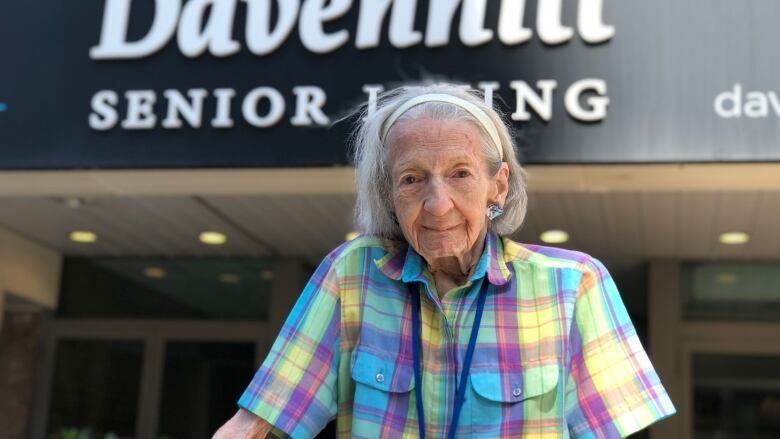Forced out at 100: Senior says she was kept in the dark about payouts from Davenhill closure
Lives of 150 tenants thrown into disarray when facility announced last month that it was closing

Though she's 100 years old, Jean McCorkle still has plenty of fire in her.
And right now, the Davenhill Senior Living resident is furious.
She says management at the recently-sold Rosedale assisted-living facility did not tell her she would be owed thousands of dollars in compensation had she gone through the formal evictions process to leave her home.
"It's a lack of respect," McCorkle said. "Whatever transpires, I'm not likely to stop feeling hurt."
It's part of an ongoing problem at the facility, she says, with residents saying they're totally in the dark about the circumstances surrounding the sale of the building, and what it means for them.
The situation is a double-edged sword: the seniors could theoretically stay, be evicted and then collect the money they're owed — but that's close to impossible, given they are dependent on the care the facility provides.
Davenhill's 150 residents found out last month the building had been sold and and they would need to leave by the end of the year. Management maintains the sale of the property and the decision to close are unrelated, and says 80 per cent of the residents have found new housing in just over a month.
Management hired a relocation consultant to help residents find new accommodations at no cost — but according to NDP MPP Jessica Bell, what they weren't told is that by accepting that help, residents waive their right to compensation through the formal eviction process.

"In my view, that is unethical," said Bell, who represents the riding of University—Rosedale. She told CBC News there was "a collective gasp in the room" when she told residents what they would be owed at a community meeting about the closure last month.
"Nobody had been told."
Residents in the dark
Ontario's Residential Tenancies Act does include a stipulation that a landlord must compensate a tenant in an amount equal to three months' rent for an eviction for the purposes of demolition or conversion to non-residential use.
But just what is going to happen to the building at 877 Yonge St. just north of Davenport Road remains unclear.
It sold back in May to a numbered company, which lists Toronto real estate lawyer Andrew Jeanrie as director and president. Land registry records show the company was set up just over a week before the building changed hands.
Jeanrie told CBC News he "wasn't aware" of any residents not being told about their rights to compensation. He refused to comment about plans for the building.

What the residents would be owed is no small number.
Bell said that in situations like these, compensation is usually in the neighbourhood of three months' rent. For McCorkle, that equals almost $6,200.
"If we'd been informed, we'd have a better understanding of what's going on," said McCorkle's daughter, Christina Stuart.
"That's what's making people angry."
Management 'working hard to support residents'
Davenhill spokesperson Genevieve Brown told CBC News in an emailed statement that "everyone involved is working hard to support resident needs, to provide updates and to adapt quickly during this time."
She did not answer specific questions about residents not being told they could be owed thousands of dollars.
"The services being offered include a dedicated relocation consultant for each resident to identify potential new homes, coordination of residence tours, packing, removal of unwanted items, unpacking and set up at the resident's new home," Brown said.
McCorkle said she is hoping to secure housing at a new seniors' home in Regent Park — but moving again as a centenarian is not an idea she relishes.
"I'd just as soon die here," she said just outside Davenhill.
Situations like these are emblematic of systemic problems with Toronto's housing market, said Geordie Dent, executive director of the Federation of Metro Tenants' Associations.
"Landlords will sometimes try to screw people out of their money," Dent said. "Rather than giving notice, they may just try to squeeze a bunch of seniors."

What's important for people to remember, he said, is that tenants have rights. In a case like this, a landlord can't just tell residents they have to move. The landlord must apply to the Landlord and Tenant Board, and even then, eviction is far from guaranteed.
But this is a special case. The clock is effectively ticking as the specialty care the facility provides will stop in November no matter what, which will force most residents out the door even if they'd like to stay and fight for their homes.
"For a lot of people here, they're old. They're reaching the end of their lives," Stuart said.
"And it's basically like a very old, wonderful tree that's being dug up after finding its roots, and it's going to be planted somewhere else. And those roots might not really grow again."

